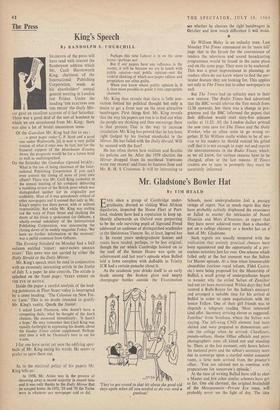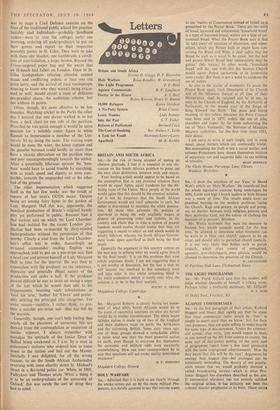Mr. Gladstone's Bowler Hat
By TIM HEALD
EVER since a group of Cambridge under- graduates, dressed as visiting West African dignitaries, inspected the Home Fleet at Port- land, students have had a reputation to keep up. Shortly afterwards an Oxford man purporting to be the sole surviving pupil of Sigmund Freud addressed an audience of distinguished academics in the Sheldonian Theatre. So, at least, legend has it. In recent years undergraduate hoaxes and stunts have tended, perhaps, to be less original, though the car which Cambridge hoisted on to the roof of the Senate House was quite an achievement and last year's episode when Balliol laid a lawn complete with daffodils in Trinity JCR had a certain panache about it.
As the academic year drinks itself to an early death among the broken glass and empty champagne bottles outside the Examination
'They've got round to that bit about the good old days again when all you needed to do was send a gunboat.' Schools, most undergraduates feel a passipg twinge of regret. Not so much regret that they have probably actively displeased the examiners or failed to master, the intricacies of Novel Disseisin and Mort d'Ancestor, as regret that they have never achieved more than a chamber pot on a college chimney or a bowler hat on a bust of Mr. Gladstone.
Such regrets are usually tempered with the realisation that entirely practical chances have been squandered and the opportunity of a pre- cocious notoriety lost for ever. One scheme which failed only at the last moment was the Sultan for Master episode. At a time when innumerable absurdities (various royal infants, Fidel Castro, etc.) were being proposed for the Mastership of Balliol, a small group of undergraduates began to wonder why the exiled Sultan of Zanzibar had not yet been mentioned. Within days they had secured a Rolls-Royce for the Sultan's emissary and arranged a suitable time for his arrival at Balliol in order to open negotiations with the Senior Fellow. One of their girl friends was to dispatch a telegram reading 'Most interested kind offer. Secretary arriving eleven as suggested. Zanzibar' from Southsea, where the Sultan was staying. The left-wing CND element had been alerted and were prepared to demonstrate out- side the college when he arrived. Chauffeurs, pseudo-sultans, Home Office officials and press photographers were all kitted out and standing by. Then, at the last moment, only hours before the national press and the sultan's secretary were due to converge upon a startled senior common room, a terse note arrived from the proctor's office: 'You are advised not to continue with preparations for tomorrow's episode.'
At the time of writing Balliol have still to elect a Master and few other similar schemes have got as far. One old chestnut, the original brainchild of the Mesopotamia—Private Eye team, will probably never see the light of day. The idea was to stage a Civil Defence exercise on the lines of the traditional public school fire practice. Suitably clad individuals—probably n Sandhurst cadets—were to tour the colleges early one morning, ordering all undergraduates to put on their gowns and report to their respective assembly points in St. Giles. They were to take with them one blanket, one toothbrush, a certifi- cate of matriculation, a large, brown, Beyond the Fringe-inspired paper bag and the secret that an H-bomb had fallen on London. Once in St. Giles loudspeakers relaying cheerful canned music and conflicting orders, at least one old army lorry, and the arrival of irate townspeople wanting to know why they weren't being evacu- ated as well, should create a state of delicious pre-prandial chaos. An ambitious scheme, but not without its points.
Often, though, it's more effective to be less complex. Watching cricket in the Parks the other day I noticed that one player walked in to bat from a deck chair on one side of the pavilion. Provided he was quick enough it would be quite Possible for a suitably comic figure in white flannels to impersonate a member of the Uni- versity XI by doing the same. The visiting team would be none the wiser, the home captain and the genuine batsman could hardly do more than have a vicious altercation on the pavilion steps and peer uncomprehendingly towards the wicket. After a potentially hilarious episode the 'bats- man' would have to avoid trouble by marching, With as much speed and dignity as were com- patible, towards the unguarded exit at the other end of the ground.
The other impersonation which suggested itself in the last few weeks was the result of reports of last term's OUDS major. Despite being set among fairy lights in the garden of Lady Margaret Hall this was, apparently, the bawdiest production of Brecht's original bawdy Play yet performed in public. Rumour had it that various cuts on which the Lord Chamber- lain had insisted for the recent London pro- duction had been re-inserted by dirty-minded undergraduates without the permission of that Worthy. Clearly a visit from the Lord Chamber- lain's office was in order. Accordingly an ex-naval commander reading English was approached, told to put on a pin-stripe suit, find a brief case and present himself at Lady Margaret Hall in time for the interval. He was then to expostulate with the producer on the indecency, depravity and generally illegal nature of the Production and order a halt. If the producer Proved difficult he was to insist on seeing a copy of the text which he would then edit to his requirements, inserting such substitutions as 'foot' for 'arse,' bother' for 'Christ' and prefer- ably deleting the principal role altogether. For some reason—inability, I rather think, to pro- cure a suitable pin-stripe suit--that too fell by the wayside.
Generally, though, one can't help feeling that nearly all the pleasures of university life are derived from the contemplation or execution of similar schemes. I always remember with nostalgia the spectacle of the Junior Dean of Balliol being awakened at 5 a.m. by a man in Policeman's uniform who ordered him to come down to the station and bail out the Master. Similarly I was delighted, for all the wrong reasons, to see the South African Ambassador reversing with some alacrity down St. Michael's Street in a flat-tyred police car. When, in 1903, Fulleylove and Thomas wrote 'What a thing it IS to be an undergraduate of the university of Oxford,' this was surely the sort of thing they had in mind.











































 Previous page
Previous page